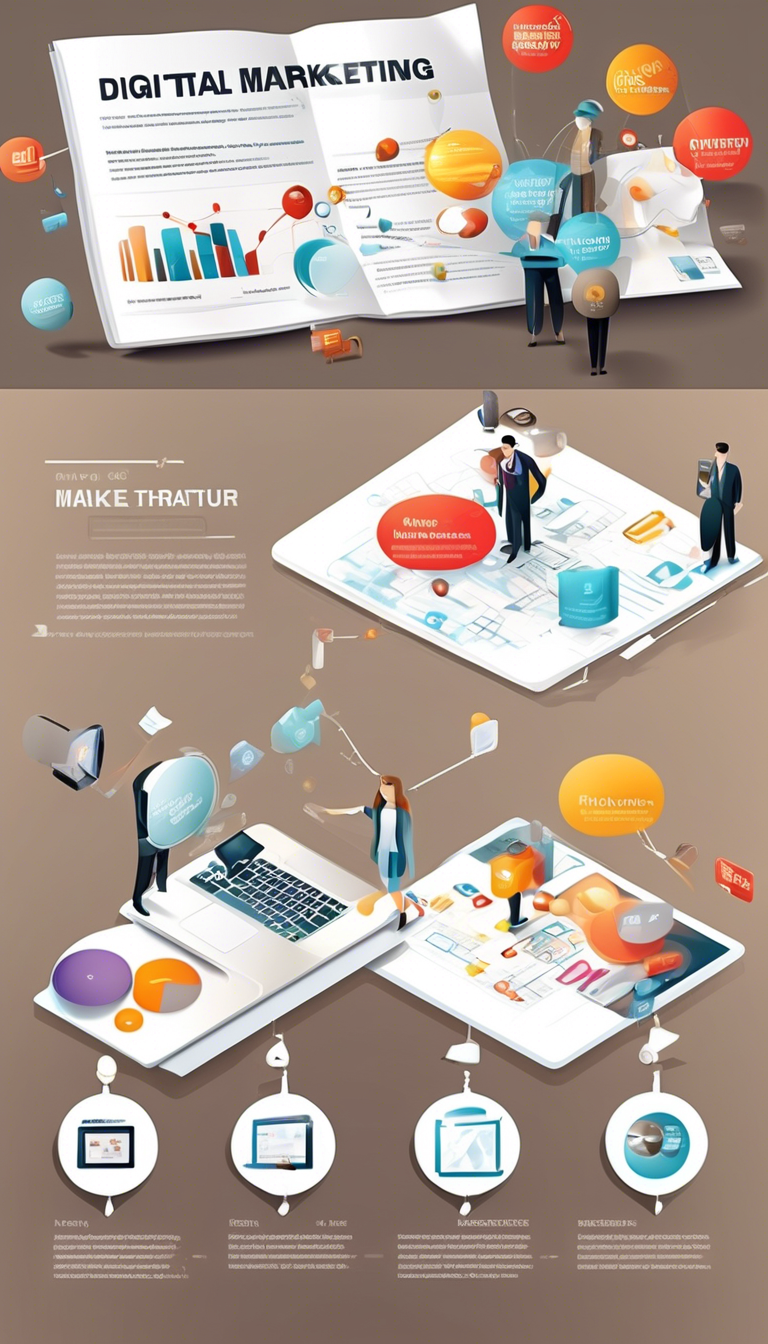Understanding Digital Marketing: How It Works and Its Key Components
Digital marketing has revolutionized the way businesses promote their products and services. But how does digital marketing work? Let’s break it down to understand its key components and strategies.
At its core, digital marketing involves using different online platforms to connect with consumers. This can include everything from social media and email to search engines and websites. Each of these platforms plays a vital role in a successful digital marketing strategy.
Search Engine Optimization (SEO)
One of the cornerstones of digital marketing is search engine optimization (SEO). SEO helps your website rank higher on search engines like Google, making it easier for potential customers to find you. Here are some essential elements of SEO:
- Keyword Research: Discovering the words and phrases your audience uses when searching for specific products or services.
- On-Page Optimization: This involves optimizing individual pages on your website by using the right keywords, creating quality content, and ensuring the site is user-friendly.
- Off-Page Optimization: Building backlinks from other reputable sites to enhance your site’s authority.
Content Marketing
Content marketing is another vital aspect of how digital marketing works. It involves creating valuable, relevant content to attract and engage your target audience. This strategy can take various forms:
- Blogs: Informative articles that address questions your audience might have.
- Videos: Engaging visual content that can explain complex topics quickly.
- Infographics: Visually appealing representations of data that simplify information.
Social Media Marketing
Social media marketing allows brands to connect with customers on platforms they frequent. This includes platforms like Facebook, Instagram, Twitter, and LinkedIn. Effective social media marketing can involve:
Leverage AI and Automation In Your Business
- Brand Awareness: Sharing content that resonates with your audience to build a following.
- Engagement: Interacting with customers through comments, likes, and shares to create a community.
- Advertising: Running targeted ad campaigns to reach specific demographics.
Email Marketing
Email marketing remains a powerful tool in digital marketing. It allows businesses to communicate with their audience directly. Key points to consider include:
- Personalization: Tailoring emails to individual preferences helps improve engagement rates.
- Segmentation: Dividing your audience into specific groups to send targeted messages.
- Value-Driven Content: Providing useful information, promotions, or updates that make people want to open your emails.
PPC Advertising
Pay-Per-Click (PPC) advertising is a digital marketing strategy where businesses pay for their ads to appear on search engines and social media platforms. It offers a way to get immediate traffic. Here’s how it works:
- Targeted Keywords: You select specific keywords to bid on, and when users search those terms, your ad may appear.
- Budget Control: You have the ability to set a budget and only pay when someone clicks on your ad.
- Analytics: Campaigns provide valuable data, helping you refine your strategy based on performance.
Analytics and Data Tracking
To understand how effective your digital marketing strategies are, you need to analyze the data. Tools like Google Analytics allow you to track:
- Website Traffic: See how many people visit your site and which pages they view.
- User Behavior: Understand how users interact with your website.
- Conversion Rates: Measure how many users complete a desired action, like making a purchase or signing up for a newsletter.
In essence, digital marketing works through a combination of strategic planning and creative execution. Each component plays an intricate role in guiding a potential customer from awareness to purchase. Understanding these elements helps you navigate the digital landscape effectively, ensuring that you reach your audience in meaningful ways.
Leverage AI and Automation In Your Business
By leveraging these strategies, you can enhance your brand visibility and create lasting relationships with your target market. Whether you’re a small business owner or part of a larger organization, embracing digital marketing is essential for growth in today’s marketplace. Engage with your audience, provide valuable content, and let the power of digital marketing work for you.
The Evolution of Digital Marketing Strategies in the Modern Business Landscape
In today’s fast-paced world, understanding the transformation of digital marketing strategies is crucial for any business aiming for success. Over the years, marketers have adapted to technological advancements and changing consumer behavior. This evolution has paved the way for innovative methods that enhance brand visibility and customer engagement.
Initially, digital marketing was primarily about setting up a website. Companies needed a digital presence, and having a website was the first step. However, as technology advanced, businesses realized they could do much more. Search engines began to dominate the online space, leading to the rise of search engine optimization (SEO).
Effective SEO strategies involve optimizing a website’s content to appear higher in search results. This practice includes researching keywords, analyzing competitors, and tailoring content to meet user intent. For example, if you sell shoes, understanding which keywords prospects use is essential. You might create blog posts about shoe styles, how to choose the right size, or even tips on caring for shoes. This focused approach drives organic traffic and enhances your site’s visibility.
Social media quickly became a vital player in the digital marketing landscape. Platforms like Facebook, Twitter, and Instagram allow brands to connect directly with their audience. Social media marketing includes creating engaging content that encourages interaction. Businesses can run campaigns and ads, promote events, and even gather instant feedback from their users. For instance, using Instagram Stories to showcase new products can effectively capture attention. Engaging visuals and user-generated content foster community and loyalty, making customers feel part of the brand.
Leverage AI and Automation In Your Business
As mobile usage started to surge, digital marketing had to adapt again. The rise of smartphones led to a significant shift in how consumers access information and shop. Today, mobile-friendly sites and apps are not just a luxury; they are essential. Brands must ensure their content displays correctly on mobile devices because many users browse on the go. This shift led to the concept of responsive design, which allows websites to adjust seamlessly to different screen sizes.
- Email marketing: One of the earliest forms of digital marketing is still incredibly relevant. Personalized emails deliver targeted content directly to customers, focusing on building relationships. For example, sending tailored recommendations based on previous purchases drives engagement and sales.
- Content marketing: High-quality content has become a cornerstone of digital marketing strategies. Blogs, videos, podcasts, and infographics provide valuable information that resonates with audiences. You can establish authority in your industry and build trust by sharing insightful content.
- Influencer marketing: Collaborating with influencers allows brands to tap into established communities. Instead of traditional advertising, this strategy leverages influential voices to reach target audiences directly, making it feel more authentic.
- Data analytics: The ability to analyze data has transformed digital marketing. Marketers can track customer behavior, campaign performance, and website traffic. This information drives decision-making and strategy adjustments, ensuring businesses stay aligned with their goals.
The conversion of digital marketing strategies did not stop with the tools available; understanding customer behavior and preferences became a game changer. Businesses can now use customer segmentation to personalize experiences. You might wonder, how does that work? It involves analyzing data points, such as purchase history and online activities, to tailor marketing efforts to individual needs.
Moreover, the importance of customer feedback cannot be overstated. With online reviews and ratings influencing purchase decisions, businesses must manage their reputation carefully. Encouraging happy customers to leave positive feedback can significantly impact potential buyers’ perceptions. Actively addressing concerns and questions demonstrates that a company values its clients.
The introduction of artificial intelligence and machine learning has also altered the landscape. These technologies enable automation of repetitive tasks, making marketing efforts more efficient. Chatbots can handle customer inquiries instantly and provide tailored responses based on past interactions. Additionally, predictive analytics assists in forecasting trends, allowing businesses to prepare strategies proactively.
Leverage AI and Automation In Your Business
The world of digital marketing is constantly evolving. Bespoke strategies are no longer just an option; they are a necessity for success. Embracing change and understanding the dynamics of modern digital marketing will allow businesses to thrive in a competitive environment. As you navigate this landscape, remember that your target audience is at the heart of every effective strategy.
Conclusion
Digital marketing is an essential tool for businesses in today’s fast-paced environment. By grasping how it works and recognizing its key components, you can better navigate this digital landscape. From search engine optimization (SEO) and content marketing to social media engagement and email campaigns, each element plays a critical role in reaching and engaging your target audience.
As you reflect on the evolution of digital marketing strategies, it’s clear that adapting to changes is crucial. Modern consumers are more informed and connected than ever before. This shift requires brands to be agile, responsive, and innovative in their approaches. Utilizing data analytics and customer insights, businesses can craft tailored experiences that resonate deeply with their audience, fostering loyalty and driving conversions.
Embracing digital marketing is not just about keeping up; it’s about staying ahead. The strategies that once worked may not be as effective today, and continuous learning is vital. By experimenting with new technologies, platforms, and trends, you can find creative ways to connect and grow your brand.
Ultimately, understanding digital marketing and its evolution equips you with the knowledge to thrive. You now have the ability to make informed decisions that reflect your customers’ needs and preferences. As you continue to explore this dynamic field, remember that success comes from a combination of strategy, flexibility, and a keen understanding of your audience. Engaging with them authentically will ensure your brand remains relevant in this ever-changing digital world.


